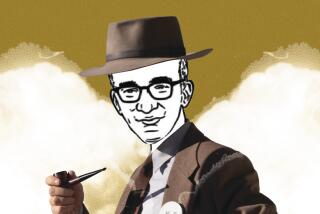AH, THE GOOD LIFE OF ‘CRITIC AND HIS WIFE’
- Share via
Mr. Robert Weiss
Artistic Director
Ensemble Theater
Santa Barbara, Calif.
Dear Mr. Weiss:
Thanks for the chance to see “A Critic and His Wife.” You say you’re not expecting a full-scale review but would like some input from a real-life theater critic about the one in John Ford Noonan’s new comedy-in-progress.
Personally, I found it a little hard to identify with the guy. We first meet him slipping into his tuxedo for the opening show of the Broadway season--preceded by dinner at Sardi’s, of course.
Ah, yes, that was how I dreamed it would be when my image of the drama critic came from the movies. I would be Addison DeWitt in “All About Eve,” shrugging my way through the Little Theatre Off Times Square lobby with this year’s blonde on my arm. A whole generation of monstrous little boys grew up with that fantasy, and John Simon even lives it out. But not many others of us do.
Noonan’s hero (Robert Silver) is not patterned after John Simon. He is a married, 30-ish, first-string critic for the New York Times. By the way, the Times isn’t going to be too happy with Noonan’s idea that their critics are appointed with the advice and consent of a couple of all-powerful Broadway landlords called, here, Javits and Klinger. (I left the New York Times in 1969, the year that Noonan broke in as a playwright, so this is news to me.)
Anyway, Noonan’s hero is particularly happy tonight because he has just received an advance to write a book. The fee, $5,000, is “unheard of for a first novel,” he crows to his wife (Alison Jordan). Actually, $5,000 is just about right for a first novel, and also just about all the author will probably ever see.
My real problem with the scene, though, comes when the critic tells his wife: “I have my job at night, I have my novel in the morning, and I have you.”
His job at night ? Good luck. Most critics who work on newspapers spend the bulk of the day in the office, making schedules, editing copy, attending meetings, justifying expense accounts, explaining why we missed that story, explaining to callers that we don’t cover high school theater and begging for space. Then we go to the show.
For verisimilitude, I suggest a scene where Noonan’s hero, just on the verge of an epiphany, gets a call from a nervous press agent who can’t understand where the photographer is--she was supposed to be there at 10 a.m. and it’s now 10:02. “Oh, never mind, she just walked in.” That’s really what the critic’s life is about: avoiding epiphanies.
Another reason for the hero’s excitement is that “All my life I’ve judged other people’s work. Now I’ve been given money to do my own.” This reminded me of a question I sometimes get at parties: “I love your stuff in the paper, Mr. Sullivan. Do you ever do any real writing?”
Others may not think so, but to the critic it feels real enough, having been expressed, as Red Smith used to say, drop by drop. A verismo touch: When the critic sits down at his desk after the show, have him throw away a couple of rotten leads before finding one he likes. Then show him hunting under the desk for his original lead.
That brings us to the scene where, halfway through a review, the critic runs over to his wife to have her praise an epiphany. This does happen, but not that blatantly, and not until the paper comes out. If the critic still admires the piece, he leaves it around where the wife can see it. If not, he stows it in the trash. Upon which she says: “Didn’t you have a review in the paper this morning?”
Here’s an idea for a scene you don’t have: Rather than having the critic’s wife refuse to attend the first show of the season, make her insist on going. This sets up the couple’s return to their apartment three hours later in an absolutely foul mood, either because the show was death on toast or because she loved it and he hated it, or the reverse.
Sample dialogue here could include: “Even a theater critic should be able to see that much,” and “You really do have the most irritating laugh.” For a last line, I suggest, “Well, then, you write the damned piece,” followed by a slamming door.
This could substitute for the scene where the New York Times forces the critic to come back early from his sabbatical because the Broadway theater is languishing without him. Frankly, I can’t imagine a crowd of theater people standing in Times Square chanting “Oppenheim! Oppenheim! He’s our man! If he can’t save us, no one can!” Theater people never praise a critic until he is in the Old Critics Home, and then only use him as a stick to beat his successor about the shoulders.
Noonan’s hero also seems too happy away from his deadlines and, especially, bylines. A newspaper columnist is, by definition, a person who needs to see his name in print at least three times a week. We need a scene where Noonan’s hero is writhing on the floor as he goes cold turkey, like Sinatra in “The Man With the Golden Arm.”
The scene where the wife gives the husband a scrapbook of his best reviews over the last 10 years is very touching. But no critic would walk out on his spouse at this moment. Not until he’d sat down with the scrapbook to see which pieces she had included. How come you left out my March 17, ‘82, review of “Evita”?
I also liked the idea that the husband had gained so much insight into the critical and creative process by the end of the play that he could take a bad review of his novel in the New York Times book section with good grace. But again this is wishful thinking. No one is that grown-up, especially if the bad review appears in your own paper. A takeover plot is always inferred.
Back to the scene where the wife doesn’t want to go to the theater and the critic says: “But people won’t know what to think if I’m all alone.” It doesn’t always work that way. Some critics’ wives go to the theater so seldom that people don’t know what to think if he isn’t all alone.
“Why don’t we ever see you, Mrs. Sullivan?” my wife was once asked at a theater door, upon which the man behind us hissed: “Because she doesn’t like the theater any more than he does.”
P.S. She thinks your play has a chance.
More to Read
The biggest entertainment stories
Get our big stories about Hollywood, film, television, music, arts, culture and more right in your inbox as soon as they publish.
You may occasionally receive promotional content from the Los Angeles Times.










